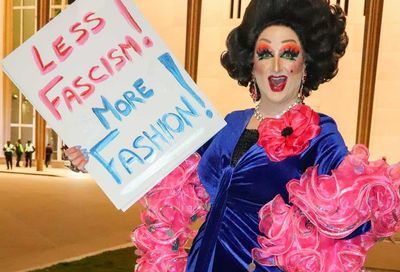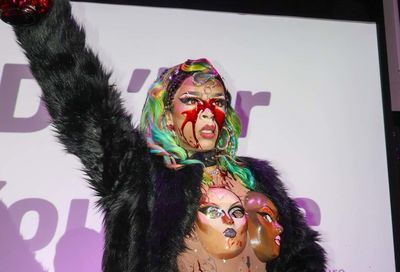On Friday, Feb. 17, New Jersey Gov. Chris Christie (R) vetoed a marriage-equality bill in his state. Hours later, Maryland Gov. Martin O’Malley (D) praised his state’s House of Delegates for passing a marriage-equality bill.
A White House spokesman, asked by Metro Weekly, won’t comment on whether President Obama would sign a marriage-equality bill into law were he a governor.

Barack Obama
Obama never was a state executive, so he has no record on this specific question. And, he won’t be directly faced with such a question as president because the federal government doesn’t marry anyone.
In the 2008 campaign, Obama — like all major candidates from both major parties — opposed marriage equality, supporting civil unions instead. But that isn’t a direct answer to the question of whether he would veto marriage equality if he were the governor of a state that passed it.
STATE ACTIONS: Only one legislature — California’s — had passed a marriage-equality bill by the time of the 2008 presidential election. California’s lawmakers had done so twice, in 2005 and 2007, but Gov. Arnold Schwarzenegger (R) vetoed the bill both times, saying in 2007 that he preferred the California Supreme Court to decide the matter. Because the court did end marriage discrimination in the state, attention during the 2008 campaign was focused on Proposition 8.
Soon after Obama’s election, though, legislative action on marriage equality picked up. In 2009, a trio of New England legislatures — Maine, New Hampshire and Vermont — and the District of Columbia’s City Council all voted for marriage equality. Democratic Governors John Baldacci and John Lynch, and Mayor Adrian Fenty (D), signed the legislation. Maine voters later overrode the Legislature in a referendum. Vermont Gov. Jim Douglas (R) vetoed the bill there, but the Legislature overrode the veto to make marriage equality the law.
There was a slight lull in legislative success until New York passed marriage equality last summer, with strong support from Gov. Andrew Cuomo (D). Already this year, the Washington and New Jersey legislatures have voted for marriage equality and, with the House of Delegates vote in Maryland, the same is expected in the coming days once the Senate votes there. Washington Gov. Chris Gregoire (D) signed her state’s bill into law, and O’Malley has said he will sign Maryland’s bill if it makes it to his desk — although referenda efforts are expected in both states.
Schwarzenegger, Douglas and Christie — all Republicans — are the only governors who have vetoed marriage-equality bills.
So, would a Gov. Obama join them and veto a marriage equality bill if it came to his desk?
It’s hard to imagine that he would.
It’s obviously easier for a governor to be more supportive of LGBT equality in a state in which a majority of the legislature is willing to vote for marriage equality. As the White House acknowledged this past summer, for example, Obama professed support for marriage equality way back in 1996 — when running for a state Senate seat from Chicago. So, if Obama was the Democratic governor of a state that passed marriage equality, then there is no reason to think Obama would do anything other than sign the bill.
NATIONAL QUESTIONS: As a president running for re-election, however, Obama has to campaign — and win — in a number of states where the legislature has not and is not likely to pass a marriage-equality bill in the coming years. All the states with marriage equality and those where the legislature has passed marriage equality — even if later overturned at the ballot — only add up to 158 electoral votes of the 270 needed to become president. Add in states that have civil unions or comprehensive domestic partnerships, and the number is only up to 226 — leaving 44 electoral votes required from a states that have no formal recognition of same-sex relationships.
What’s more, 29 states representing more than 300 electoral votes — including several of the states counted in the above 226 electoral votes — have passed constitutional amendments banning recognition of marriage equality.
Those numbers are among the likeliest reasons why Obama’s position on marriage equality is ”evolving” and not evolved.
But, with so much state action on marriage, the question is nonetheless being asked by LGBT activists and reporters: Does Obama support the signing of such legislation or would he prefer the vetoing of such bills?
When it comes to the federal government recognizing same-sex couples whose marriages are recognized at the state level, Obama is a strong supporter. He concluded, along with his attorney general, a year ago that the federal definition of marriage — Section 3 of the Defense of Marriage Act — is unconstitutional because it discriminates against people based on sexual orientation.
The president has called for DOMA’s repeal, endorsing the Respect for Marriage Act, which would do so and also guarantee that a same-sex couple married in one state would continue to have their marriage recognized by the federal government if they moved to a state where their marriage is not recognized.
Obama also opposes state efforts to ban marriage equality or take away rights. White House press secretary Jay Carney, specifically in reference to Proposition 8 in California, said recently of the president, “He’s long opposed divisive and discriminatory efforts to deny rights and benefits to same-sex couples.”
But Obama’s position is less clear when it comes to affirmative efforts. When lawmakers in Albany were considering marriage equality legislation in June 2011, Obama visited New York City and said, ”New York is doing exactly what democracies are supposed to do. There’s a debate; there’s deliberation about what it means here in New York to treat people fairly in the eyes of the law.”
This caused quite a stir, as many took it to mean that Obama was okay if a state decided that same-sex couples should not be allowed to marry. It led to quite a few pieces of commentary decrying what they characterized as Obama’s ”states’ rights” view.
Obama later clarified the New York statements, saying, ”I think the combination of what states are doing, what the courts are doing, the actions that we’re taking administratively, all are how the process should work.” He also said that ”what happened in New York last week I think was a good thing,” which — though couched in terms of the effort in the state to ”talk … through the issues” — was not the sort of answer being given by opponents of marriage equality.
If forced to pick a side, then, it sounded like Obama would be on the side of marriage equality supporters — even if he won’t say so directly.
MOVING FORWARD: Since then, although Obama has been asked publicly and privately about the issue, there’s been little movement about his views on the issue.
On Friday, Feb. 17, as Air Force One traveled to Washington state, where Obama would be greeted at the airport by Gov. Gregoire less than a week after she signed her state’s marriage equality bill, Carney was asked: ”Is his view on same-sex marriage … still evolving?”
“I have no update for you on that,” Carney replied.
In the past two weeks, however, from the challenge to California’s Proposition 8 to the votes for marriage equality in multiple states to the Freedom to Marry proposal — backed by House Minority Leader Nancy Pelosi (D-Calif.) — urging inclusion of a marriage-equality plank in the Democratic platform, it is clear that it will remain a subject of debate.
In the course of the next nine months, Obama and his surrogates will be faced with many circumstances in which the president’s ”evolving” position will be scrutinized.
On Sunday, Feb. 19, one of Obama’s senior campaign advisors, Robert Gibbs, appeared on ABC News’s This Week, and guest host Jake Tapper asked him whether Obama supports the marriage-equality platform plank.
The response: ”I don’t know the answer to that.”
That worked on Sunday, but the clock is ticking.
Ask a governor.























